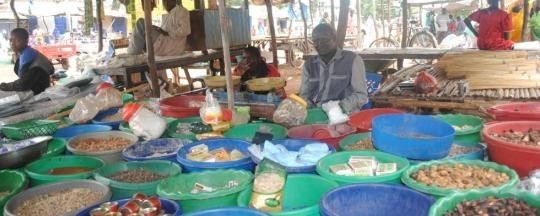Traders in South Sudan’s Northern Bahr el Ghazal State have petitioned the government of South Sudan in Juba to immediately empower and support their businesses so that they can deliver services to vulnerable grass-root communities.
The local traders said the South Sudan markets are controlled by foreign investors and merchants who import all kinds of food commodities and other items from neighboring countries and sell at exorbitant prices.
Several eminent South Sudanese investors and merchants who spoke to Radio Tamazuj strongly urged the government to empower them through the provision of cash capital, normalization of border agreements, and reconstruction of dilapidated roads among other things.
Musa Deng, a trader in Aweil North County, said the most important support local merchants need from the government is the repair of commercial roads, reduction of taxes for local businessmen, and that things will improve if the government accepts to extend assistance to traders.
“The state of roads is very poor but if they are repaired, the commercial movement will be okay,” Deng said. “The government should repair the roads, reduce taxes, and remove too many checkpoints, then commerce will thrive.”
A seasoned elderly trader, Wol Amuk, said he has been a merchant since before South Sudan seceded and said traders played a big role in providing vital services and essential goods to the people and genuinely need government support.
“It is important to support local traders because it empowers them to help citizens by ensuring that necessary goods like sugar, flour, dura, and other commodities are cheaply available in the market. The local traders can go and bring the goods by themselves if the road is reopened instead of foreign traders,’’ said Amuk.
Numerous South Sudanese traders along the common border with neighboring Sudan decried the closure of the trade route between the two countries saying it has led to deplorable living conditions.
They tasked the government to initiate peace with neighboring Sudan to allow goods flow between the countries. They also urged the government to review the amount of taxes collected from local investors to address the challenges they are facing.
Abraham Garang, a merchant in the border trade zone of Warawar in Aweil East County, said the main trade route (Aweil-Mairam) between Sudan and South Sudan via the area is closed since road works were suspended a couple of months ago.
“The condition is still deplorable because the road is closed, the commercial situation is hard, no goods, no petroleum. We urge the government to ensure peace returns and also to improve bilateral relations with Sudan so that the border is opened because there is no movement of traders and goods,” Garang said.
Malong Deng Nyuany, a trader in Aweil Town, said the government tried to support them in previous years but the exercise was halted with the eruption of the civil war. Malong urged the government to release hard currency, food, and non-food items at government rates.
“The government was bringing some things to traders, like dollars so that someone can go and bring the goods and the government stopped it. The government was donating sugar to be distributed by the traders; there was flour and pwereoleum given to the traders-all these things were given to the traders but they stopped for a long time,” Malong said.
Northern Bahr el Ghazal State Chamber of Commerce confirmed the challenges affecting them and called for more support. The major challenges according to the chamber are the high exchange rate of the dollar and exorbitant taxes imposed by the government on imported and exported items.
Deng Athian, the leader of Northern Bahr el Ghazal State’s Chamber of Commerce, requested the government to control the market through competition by empowering local traders to compete with counterpart merchants.
“We the traders are just asking the government to give us support through the tax reduction. The taxes are very high and also the rate of the dollar is very high and it negatively affects business,” Athian said.
He insisted that local traders will be able to import all the needed items if the government releases the funds in hard currency.
The South Sudanese Business Community chairman, Ayii Duang Ayii, slammed the government for failures in supporting South Sudanese traders before and after the independence.
Ayii said there are three pillars in every country- the public sector, private sector, and the coalition of civil society. According to Ayii, the function of the public sector (the government) is to empower the private sector but the government does not do this.
“The first and second pillars are based on service delivery. The public sector has to introduce laws and create a conducive environment and offer job opportunities for national investors and foreigners, but the priority is for nationals so that the nationals will participate in services delivery and participation in markets,” he added.
Ayii said there are many South Sudanese who want to invest in different fields but are frustrated by the government due to lack of allocation of special funds to kick start their business ventures.
He accused former ministers of finance and economic planning of diverting government finances into their interests and donating public funds to their immediate families.
“Between 2005 and 2011, South Sudan was receiving a lot of money from the national unity government and international funders but nothing tangible was done by the government to empower local businessmen and women,” Ayii lamented. “Funds were embezzled by government officials by creating ghost companies while the real national investors are not considered for the start-up funding opportunities. All this contributes to foreign invasion over the local market.”
Ayii said he looks forward to enhanced collaboration between the government and the business community to find ways of empowering national investors so that they can participate in national development.




